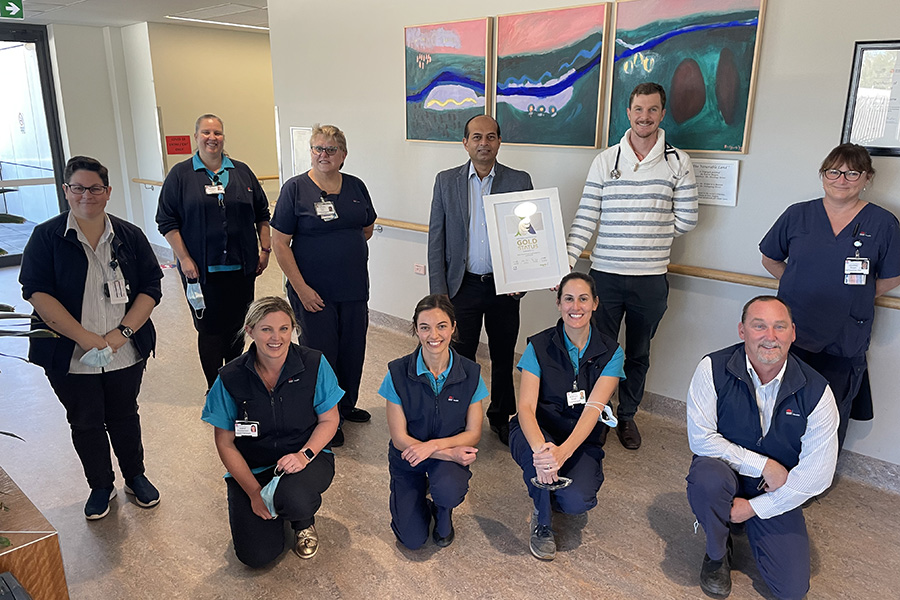
Port Macquarie Base Hospital Stroke Team: back row (left to right) Nurse Unit Manager Kathy Boom, Dietitian Michelle Coad, Acting Stroke Care Coordinator Shae Miller, Consultant Geriatrician/Stroke Team Medical Dr Nishantha Senanayake, Senior Medical Officer Dr Daniel Tilley and Telestroke Coordinator Leanne Bryant; front row (left to right) Speech Pathologist Annie Cumberland, Occupational Therapist Gemma Mackenzie, Physiotherapist Rebecca Annett and Acting Community and Allied Health Manager Danny Passfield. Absent: Geriatrician Dr Matthew Kinchington and Stroke Care Coordinator Jennifer Steel.
Stroke care recognised at two Mid North Coast hospitals
Jul 13, 2022The stroke units at Port Macquarie Base Hospital (PMBH) and Coffs Harbour Health Campus (CHHC) have received the prestigious World Stroke Organization Angels Gold Status Awards for meeting the highest standards in stroke treatment and care.
The Angels initiative, a partnership between the World Stroke Organization, European Stroke Organisation and Boehringer Ingelheim, aims to optimise the standard of treatment in stroke centres worldwide and improve patient outcomes by setting global benchmarks for best practice stroke care.
PMBH Stroke Care Coordinator Jennifer Steel said her team was so proud to have been awarded Angels Gold Status for the second consecutive year.
“Our staff are dedicated and committed to providing the best care following evidence-based practice,” Mrs Steel said.
“It is wonderful that this award recognises not only the efforts of the stroke team, but all the other teams involved with providing holistic care for our patients.
“The Mid North Coast is the national hot spot for stroke so having rapid access to a specialised stroke service is essential for our community.”
CHHC Stroke Unit Clinical Nurse Consultant Amanda Buzio said achieving WSO Gold Status was a great honour and testament to a team effort to enhance local stroke care.
“Stroke is a time-critical medical emergency where blood supply to the brain is interrupted or reduced,” Ms Buzio said.
“Acting swiftly on the signs of stroke and implementing best practice care requires coordination between ambulance, emergency department, radiology and stroke unit staff.
“This Award is a welcome acknowledgment of the efforts and commitment of our staff, demonstrating that the care we provide is in line with recommended practice and of an international standard, giving our stroke patients the best chance of a good recovery.”
Training, protocols and the performance of the hospital’s stroke unit were assessed as part of the Angels Initiative, which includes a target of restoring blood-flow to the brain to more than half of eligible patients within 60 minutes of their hospital arrival.
“Ensuring appropriate patients receive clot busting therapy within 60 minutes of arriving at the hospital door is the gold standard and means that more people will survive and live well after stroke,” Ms Buzio said.
A major report by Deloitte Access Economics, commissioned by the Stroke Foundation, highlights that people living in regional Australia are 17 per cent more likely to suffer a stroke than those living in metropolitan areas.1
To achieve WSO Gold status a hospital must demonstrate a range of outcomes, including optimum time to treatment, coordinated care, appropriate scans and screening, and ensuring patients are discharged from hospital on medications to minimise the risk of further stroke.
The Angels initiative Medical Project Manager in Australia, Kim Malkin, said every step toward improving care and outcomes for stroke patients was worth celebrating, as there were approximately 38,000 stroke events across Australia each year – around 100 every day.2
“Every hospital that achieves WSO Angels Gold status should be justifiably proud, as should the communities they serve,” she said.
About Stroke in Australia 1
- One stroke occurs every 19 minutes in Australia.
- 445,087 survivors of stroke are currently living in Australia.
- 8,703 Australians will die as a result of stroke this year.
- The economic cost of stroke exceeds $6.2 billion, with a further $26 billion in lost wellbeing – due to short and long-term disability, and premature death nationally.
- Reducing uncontrolled high blood pressure and providing quicker access to emergency stroke treatments has the potential to save $179 million over five years in economic costs and $2.4 billion in reduced mortality and improved wellbeing annually.
- 24 per cent of strokes occur in Australians aged 18-54 years. In 2012 this number was just 14 per cent.
Media Contacts
Mid North Coast Local Health District – Simone Plews, Media Manager – 0408 693 688
WSO Angels Initiative – Georgina Connery, Ethical Strategies – 0420 377 685
References
1. Deloitte Access Economics – Stroke in Australia – No Postcode Untouched, 2020. Available at: https://strokefoundation.org.au/en/News/2020/11/04/02/57/No-Postcode-Untouched.
2. Australian Institute of Health and Welfare.

Coffs Harbour Health Campus Stroke Team (left to right) Medical Intern Dr Isabel Temperley, physiotherapist Tim Kuchel, Clinical Nurse Educator Helen King, Registered Nurse Sheena Wunderlich, Clinical Nurse Consultant Amanda Buzio, Nursing Unit Manager Jennifer Helisma, Visiting Medical Officer Dr Iain Bruce, Clinical Nurse Specialist Ashleigh Franck, Occupational Therapist Gerard de Carle, Ward Clerk Lisa Rimmer, Registrar Dr Winston Thai and Social Worker Leanne Varley.
